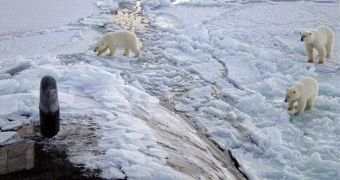Under the US Endangered Species Act of 2008, the polar bear populations in Alaska have been listed with an increased risk of extinction. Global warming and human activities in the area are considerably reducing the habitats in which the bears usually live, so the US Department of the Interior has recently issued an initiative that aims at creating “critical habitats” in Alaska, to protect the animals from danger. The WWF applauds this initiative in a press release it issued recently.
“Designation of critical habitat affords important protections to the polar bear, a species imperiled by dramatic changes in its sea ice environment. As sea ice habitat shrinks, it becomes increasingly important to protect areas that are crucial for the bears’ survival,” WWF Polar Bear Conservation Senior Program Officer Geoff York explains. “Polar bears are not land animals – they evolved over thousands of years to be sea ice specialists. They need the ice to hunt for seals, their primary food. Take away the ice and you take away the bears,” he adds.
“The changes we are witnessing in the Arctic do not just raise concerns about the fate of iconic species such as polar bear – our own future is at stake. The planet is changing in dangerous and unpredictable ways and the longer we wait to address the climate crisis the costlier it will be. While designation of critical habitat for polar bear is a positive step, the future of the entire Arctic ice ecosystem depends on nations reaching a global climate agreement in Copenhagen this December,” York says.
This year's UN climate meeting is the third in a row, and hopes are high that a conclusion will be reached, and a follow-up agreement to the Kyoto Protocol will be signed. At last year's meeting, held in Poznan, Poland, the countries that participated could not decide on anything, and disagreement between developed and developing nations brought the negotiations to a stand-still. In 2009, further meetings between nations brought a positive conclusion closer to fruition, analysts believe.

 14 DAY TRIAL //
14 DAY TRIAL //